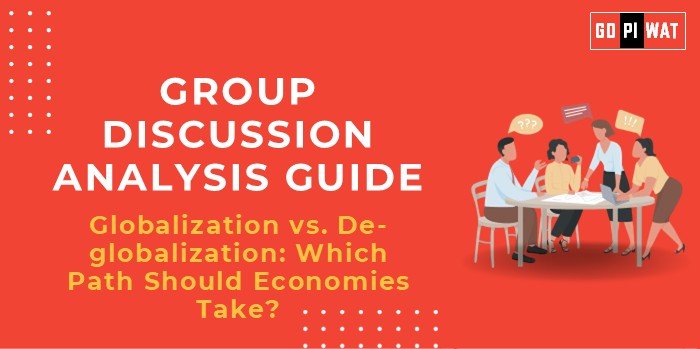📋 Group Discussion (GD) Analysis Guide: Globalization vs. De-globalization: Which Path Should Economies Take?
🌐 Introduction to the Topic
- 📌 Opening Context: “In today’s interconnected world, the debate between globalization and de-globalization shapes the future of economies, influencing trade policies, international relations, and economic resilience.”
- 📌 Topic Background: Globalization refers to the increasing integration of economies through trade, investment, technology, and cultural exchange. While it has driven economic growth and development, recent events like the COVID-19 pandemic and geopolitical tensions have sparked discussions on de-globalization, emphasizing self-reliance and economic security.
📊 Quick Facts and Key Statistics
- 🌍 Global Trade Volume: In 2022, the global trade value of goods exported worldwide amounted to approximately $24.9 trillion.
- 📉 Foreign Direct Investment (FDI) Inflows: Global FDI fell by 12% in 2022 to $1.3 trillion, due mainly to overlapping global crises.
- 📈 Tariff Increases: Average global tariffs have seen fluctuations, with recent trends indicating a rise due to protectionist policies.
- 🏭 Reshoring Trends: A significant number of firms in developed economies are prioritizing local suppliers to mitigate supply chain disruptions.
- 💻 Digital Trade Growth: Cross-border e-commerce expanded significantly in recent years, highlighting globalization’s technological facets.
🤝 Stakeholders and Their Roles
- 🏛️ Governments: Formulate policies balancing trade openness with national security and economic stability.
- 🌐 Multinational Corporations (MNCs): Drive globalization through global supply chains while adapting to reshoring trends.
- 🏢 Local Businesses: Advocate for policies that enhance competitiveness in a de-globalizing world.
- 🌍 International Organizations: Entities like the World Trade Organization (WTO) and International Monetary Fund (IMF) mediate between globalization advocates and protectionist policies.
- 👥 Citizens and Workers: Their employment opportunities and cost of living are directly affected by globalization dynamics.
🏆 Achievements and ⚠️ Challenges
Achievements
- 🌎 Poverty Reduction: Globalization has contributed to lifting over a billion people out of poverty since the 1990s.
- 📈 Economic Growth: Countries embracing globalization have experienced significant GDP growth.
- 💡 Technological Advancement: Global collaboration has accelerated innovation and technological progress.
Challenges
- ⚖️ Inequality: Globalization has exacerbated income disparities within and between countries.
- 🔗 Supply Chain Vulnerabilities: Global crises have exposed the fragility of interconnected supply chains.
- 🌱 Environmental Concerns: Increased production and transportation have led to environmental degradation.
🌍 Global Comparisons
- 🇪🇺 Globalization Success: The European Union’s single market has facilitated seamless trade among member states.
- 🇺🇸 De-globalization Success: The United States’ recent emphasis on reshoring manufacturing has aimed to boost domestic industries.
📖 Case Study
- 🇮🇳 India and RCEP: India’s decision to abstain from the Regional Comprehensive Economic Partnership (RCEP) highlighted concerns over protecting local industries amidst globalization pressures.
💡 Structured Arguments for Discussion
- Supporting Globalization: “Globalization enhances innovation by encouraging knowledge sharing across borders.”
- Supporting De-globalization: “Localized economies reduce vulnerabilities to external shocks, as seen during the COVID-19 pandemic.”
- Balanced Perspective: “A hybrid approach of ‘smart globalization’ balances global trade with local resilience.”
🗣️ Effective Discussion Approaches
- 📊 Opening Approaches:
- “With global trade contributing significantly to GDP, the shift towards reshoring is reshaping economic policies.”
- “While globalization fosters growth, its unchecked form deepens inequality.”
- “The COVID-19 pandemic exposed the vulnerabilities of global supply chains, prompting a reevaluation of globalization.”
- 📌 Counter-Argument Handling:
- Acknowledge opposing viewpoints, such as environmental impacts or economic dependencies, while introducing solutions like sustainable globalization.
📈 Strategic Analysis of Strengths and Weaknesses
SWOT Analysis
- Strengths:
- Globalization: Access to larger markets, enhanced innovation through collaboration.
- De-globalization: Strengthened local industries, reduced dependency on external factors.
- Weaknesses:
- Globalization: Increased inequality, environmental degradation.
- De-globalization: Limited market access, potential for economic inefficiencies.
- Opportunities:
- Globalization: Technological advancements, cultural exchange and understanding.
- De-globalization: Development of local supply chains, focus on sustainable practices.
- Threats:
- Globalization: Geopolitical tensions, overreliance on global supply chains.
- De-globalization: Trade wars, isolation from global innovation.
🎓 Connecting with B-School Applications
- 🌍 Real-World Applications:
- Strategy design for firms navigating global trade disruptions.
- Research on economic policies balancing globalization and self-reliance.
- 📚 Sample Interview Questions:
- “How does de-globalization impact multinational corporations’ operations?”
- “Evaluate the economic risks and benefits of reshoring manufacturing.”
- 💡 Insights for B-School Students:
- Explore market opportunities in hybrid globalization models.
- Understand geopolitical risks in global supply chains.


